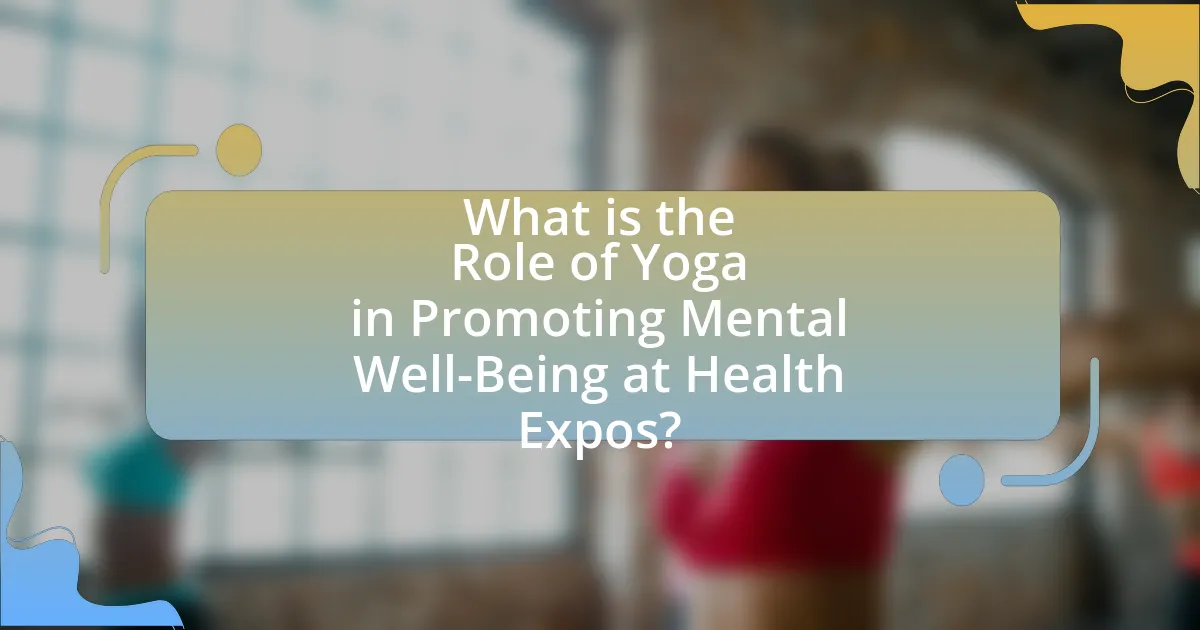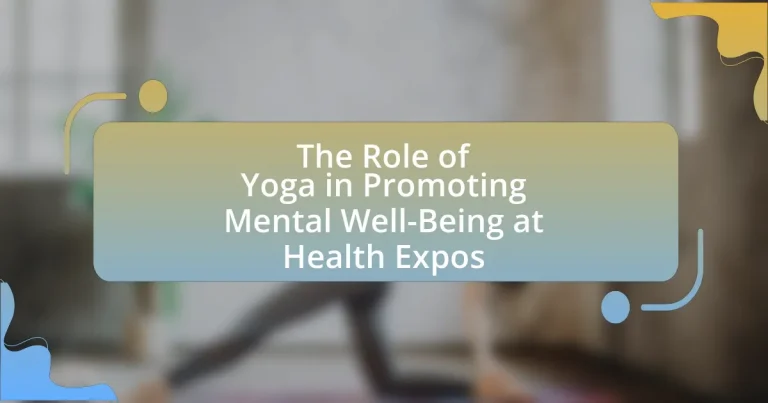Yoga plays a crucial role in promoting mental well-being at health expos by offering techniques for stress reduction, mindfulness, and emotional balance. Research indicates that regular yoga practice can significantly decrease anxiety and depression levels, enhancing mood and emotional regulation. Health expos serve as vital platforms for showcasing various yoga styles, facilitating community engagement, and providing access to resources that support mental health. The article explores the specific mental health benefits associated with yoga, the influence of health expos on community health awareness, and effective strategies for promoting yoga practices to attendees.

What is the Role of Yoga in Promoting Mental Well-Being at Health Expos?
Yoga plays a significant role in promoting mental well-being at health expos by providing participants with techniques for stress reduction, mindfulness, and emotional balance. Research indicates that yoga practices, which include physical postures, breathing exercises, and meditation, can lead to decreased levels of anxiety and depression. A study published in the Journal of Clinical Psychology found that participants who engaged in regular yoga sessions reported improved mood and reduced stress levels, highlighting yoga’s effectiveness as a mental health intervention. Additionally, health expos often create a supportive community environment, further enhancing the mental health benefits of yoga through social interaction and shared experiences.
How does yoga contribute to mental well-being?
Yoga contributes to mental well-being by reducing stress, anxiety, and depression through its combination of physical postures, breathing exercises, and meditation. Research indicates that regular yoga practice can lead to significant improvements in mood and emotional regulation. For instance, a study published in the Journal of Clinical Psychology found that participants who practiced yoga experienced a 30% reduction in anxiety levels compared to those who did not engage in yoga. Additionally, yoga enhances mindfulness, which has been shown to improve overall mental health by fostering a greater sense of presence and awareness.
What specific mental health benefits are associated with yoga?
Yoga is associated with several specific mental health benefits, including reduced anxiety, improved mood, and enhanced emotional regulation. Research indicates that regular yoga practice can lower levels of the stress hormone cortisol, which contributes to anxiety reduction. A study published in the Journal of Clinical Psychology found that participants who engaged in yoga experienced significant decreases in anxiety and depression symptoms compared to those who did not practice yoga. Additionally, yoga promotes mindfulness and self-awareness, which can lead to better emotional regulation and resilience against stressors. These benefits are supported by various studies, including a meta-analysis in the journal Health Psychology Review, which concluded that yoga is effective in improving mental health outcomes across diverse populations.
How does yoga practice influence stress reduction?
Yoga practice significantly influences stress reduction by promoting relaxation and mindfulness. Through techniques such as controlled breathing, meditation, and physical postures, yoga activates the parasympathetic nervous system, which counteracts the stress response. Research published in the Journal of Clinical Psychology by Khalsa et al. (2016) indicates that regular yoga practice can lead to decreased levels of cortisol, a hormone associated with stress. Additionally, a meta-analysis in the Journal of Alternative and Complementary Medicine found that yoga interventions significantly reduce anxiety and stress levels in various populations. These findings underscore the effectiveness of yoga as a tool for enhancing mental well-being and managing stress.
Why are health expos significant for promoting yoga?
Health expos are significant for promoting yoga because they provide a platform for direct engagement between yoga practitioners and potential participants. These events facilitate demonstrations, workshops, and discussions that showcase the mental and physical benefits of yoga, thereby increasing awareness and interest. Research indicates that exposure to yoga practices in community settings, such as health expos, can lead to higher participation rates; for instance, a study published in the Journal of Alternative and Complementary Medicine found that community-based yoga programs significantly improved participants’ mental well-being. Thus, health expos effectively serve as a catalyst for expanding the reach and impact of yoga in promoting mental health.
What role do health expos play in community health awareness?
Health expos play a crucial role in enhancing community health awareness by providing accessible information and resources on various health topics. These events facilitate direct interaction between health professionals and community members, allowing for the dissemination of knowledge regarding preventive care, healthy lifestyles, and available health services. For instance, studies have shown that participation in health expos can lead to increased health screenings and improved health behaviors among attendees, as they gain firsthand insights and motivation to adopt healthier practices.
How do health expos facilitate access to yoga resources?
Health expos facilitate access to yoga resources by providing a centralized platform where attendees can discover various yoga classes, workshops, and informational sessions. These events often feature multiple vendors and organizations that showcase yoga-related products, services, and practices, making it easier for individuals to explore different styles and approaches to yoga. For instance, a study by the Yoga Alliance in 2020 indicated that 36 million Americans practice yoga, highlighting the growing interest in yoga resources, which health expos capitalize on by offering direct access to instructors and materials. Additionally, health expos frequently include demonstrations and free trial classes, allowing participants to engage with yoga practices firsthand, thereby enhancing their understanding and accessibility to yoga as a tool for mental well-being.
What types of yoga are commonly featured at health expos?
Common types of yoga featured at health expos include Hatha, Vinyasa, Ashtanga, Yin, and Restorative yoga. Hatha yoga focuses on basic postures and breathing techniques, making it accessible for beginners. Vinyasa yoga emphasizes fluid movement and breath synchronization, appealing to those seeking a dynamic practice. Ashtanga yoga is a rigorous style that follows a specific sequence of poses, attracting more experienced practitioners. Yin yoga involves holding poses for extended periods to enhance flexibility and relaxation, while Restorative yoga uses props to support the body in gentle poses, promoting deep relaxation and stress relief. These styles are often showcased due to their popularity and effectiveness in promoting mental well-being, as evidenced by numerous studies highlighting yoga’s benefits for stress reduction and emotional health.
Which yoga styles are most effective for mental well-being?
Hatha yoga, Vinyasa yoga, and Kundalini yoga are among the most effective styles for enhancing mental well-being. Hatha yoga promotes relaxation and stress reduction through its focus on physical postures and breathing techniques, which have been shown to lower cortisol levels, a stress hormone. Vinyasa yoga, characterized by its fluid movement and breath synchronization, fosters mindfulness and can improve mood by increasing serotonin levels. Kundalini yoga, which combines physical postures, breathing exercises, and meditation, has been linked to increased emotional resilience and reduced anxiety, as evidenced by studies indicating its positive effects on mental health.
How do different yoga practices cater to various mental health needs?
Different yoga practices cater to various mental health needs by targeting specific psychological conditions and promoting overall well-being through tailored techniques. For instance, Hatha yoga, with its focus on physical postures and breathing, is effective for reducing anxiety and stress, as evidenced by a study published in the Journal of Clinical Psychology, which found that participants experienced significant reductions in anxiety levels after consistent practice. Similarly, restorative yoga, which emphasizes relaxation and gentle stretching, has been shown to alleviate symptoms of depression, as indicated by research from the International Journal of Yoga, where participants reported improved mood and emotional regulation. Additionally, practices like Kundalini yoga, which incorporates meditation and chanting, can enhance emotional resilience and self-awareness, supporting individuals dealing with trauma or emotional distress. Thus, the diversity in yoga practices allows for a comprehensive approach to addressing various mental health needs, backed by empirical research demonstrating their effectiveness.
How can participants engage with yoga at health expos?
Participants can engage with yoga at health expos by attending scheduled yoga classes, workshops, and demonstrations led by certified instructors. These sessions provide hands-on experience and allow participants to learn various yoga techniques that promote mental well-being. Additionally, participants can interact with yoga-related vendors, explore products such as mats and apparel, and gather information on local yoga studios and classes. Engaging in discussions with experts at these expos can further enhance understanding of yoga’s benefits for mental health, supported by studies indicating that regular yoga practice reduces stress and anxiety levels.
What workshops or sessions are typically available for attendees?
Attendees at health expos typically have access to workshops and sessions focused on yoga practices, mindfulness techniques, and mental well-being strategies. These workshops often include guided yoga sessions, meditation practices, and discussions on the psychological benefits of yoga, such as stress reduction and emotional balance. Research indicates that yoga can significantly enhance mental health by promoting relaxation and reducing anxiety, as highlighted in studies published in journals like the Journal of Clinical Psychology.
How can attendees incorporate yoga into their daily routines after the expo?
Attendees can incorporate yoga into their daily routines after the expo by setting aside specific times each day for practice, such as morning or evening sessions. Establishing a consistent schedule helps create a habit, making it easier to integrate yoga into daily life. Research indicates that regular yoga practice can enhance mental well-being, reduce stress, and improve overall health, as shown in studies published in journals like the Journal of Clinical Psychology, which found that participants who practiced yoga reported lower levels of anxiety and depression. By utilizing online resources or apps for guided sessions, attendees can maintain their practice and continue to reap the mental health benefits associated with yoga.
What are the best practices for promoting yoga at health expos?
The best practices for promoting yoga at health expos include offering free introductory classes, providing informational materials about the mental and physical benefits of yoga, and engaging attendees through interactive demonstrations. Free classes attract participants and allow them to experience yoga firsthand, which can lead to increased interest and enrollment in future sessions. Informational materials should highlight research, such as studies showing that yoga reduces stress and anxiety, thereby enhancing mental well-being. Interactive demonstrations engage attendees, allowing them to ask questions and learn about different yoga styles, which fosters a deeper connection to the practice.
How can exhibitors effectively showcase the benefits of yoga?
Exhibitors can effectively showcase the benefits of yoga by providing interactive demonstrations and workshops that engage attendees. These activities allow participants to experience yoga firsthand, highlighting its physical and mental health benefits, such as stress reduction and improved focus. Research indicates that yoga can decrease anxiety and enhance overall well-being, as evidenced by a study published in the Journal of Clinical Psychology, which found that participants who practiced yoga reported significant reductions in anxiety levels. By incorporating testimonials and visual aids, such as infographics that illustrate the positive effects of yoga on mental health, exhibitors can further reinforce the message and attract interest.
What strategies can be used to attract participants to yoga sessions?
To attract participants to yoga sessions, offering free introductory classes is an effective strategy. This approach allows potential attendees to experience the benefits of yoga without financial commitment, increasing their likelihood of returning for paid sessions. Research indicates that free trials can boost participation rates by up to 30%, as seen in various fitness studies. Additionally, promoting the mental health benefits of yoga, such as stress reduction and improved mood, can resonate with individuals seeking mental well-being, particularly at health expos where wellness is a focal point. Engaging social media campaigns showcasing testimonials and success stories can further enhance visibility and interest, as platforms like Instagram have proven effective in attracting fitness enthusiasts.
What resources are available for further exploration of yoga and mental well-being?
Resources for further exploration of yoga and mental well-being include academic journals, online courses, and books focused on the intersection of yoga practices and mental health. Notable academic journals such as the “International Journal of Yoga” and “Journal of Alternative and Complementary Medicine” publish peer-reviewed studies that examine the effects of yoga on mental health outcomes. Online platforms like Coursera and Udemy offer courses that delve into yoga techniques and their psychological benefits, often created by experts in the field. Additionally, books such as “The Healing Power of Yoga” by Dr. Richard Miller provide insights into how yoga can enhance mental well-being, supported by research and practical applications. These resources collectively contribute to a deeper understanding of how yoga can be utilized to promote mental health.





